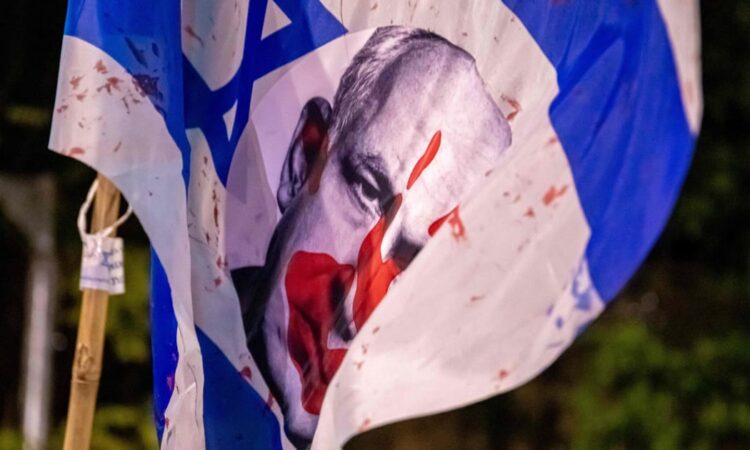
Press play to listen to this article
Voiced by artificial intelligence.
Paul Ronzheimer is the deputy editor-in-chief of BILD and a senior journalist reporting for Axel Springer, the parent company of POLITICO.
Israeli Prime Minister Benjamin Netanyahu has vehemently denied accusations he allowed Qatar to fund and strengthen the militant group Hamas in order to divide Palestinians into rival political camps, slamming the claims as “ridiculous.”
Netanyahu’s opponents in Israel argue his government spent years actively boosting Hamas in Gaza by allowing Qatar to channel hundreds of millions of dollars to the coastal enclave in a risky game of “divide-and-rule,” that was meant to play the Islamist militants from Hamas off against the Palestinian Authority in the West Bank.
“It’s a big lie that I wanted to build [up] Hamas. Ridiculous,” Netanyahu said in an interview with Axel Springer, POLITICO’s parent company. “You don’t go to war three times with Hamas or do major military operations if you want to build up Hamas.”
Former Prime Minister Ehud Olmert is a leading example of a politician who takes that version of events with a pinch of salt. “In the last 15 years, Israel did everything to downgrade the Palestinian Authority and to boost Hamas,” he previously told POLITICO. “Gaza was on the brink of collapse because they had no resources, they had no money, and the PA refused to give Hamas any money. Bibi saved them. Bibi made a deal with Qatar and they started to move millions and millions of dollars to Gaza.”
Most incriminatingly, Netanyahu himself said in 2019 at a Likud party conference: “Anyone who wants to prevent the establishment of a Palestinian state needs to support strengthening Hamas.”
Netanyahu on Tuesday, however, dismissed those charges, claiming he only allowed Qatari money to flow into Gaza to avoid a humanitarian catastrophe, not to strengthen the arm of the administration there.
“We wanted to avoid a civilian humanitarian collapse — disease, rampant hunger and other things that would have created an impossible humanitarian situation,” he said. “That’s why successive Israeli governments allowed this money to go in, not in order to strengthen Hamas. We didn’t want to strengthen Hamas at all. We wanted to weaken it and degrade its capabilities as far as we could.”
Israel and Hamas are on the fifth day of a fragile truce — which has so far allowed for the release of 69 of the 240 hostages taken by the militant group during its October 7 attack.
But all eyes are now turned to the “day after” and what the end of the truce will mean for Israel and Gaza.
Netanyahu said Israel would keep its side of the truce as long as Hamas keeps its, but he noted that Hamas would still have to be destroyed after the cease-fire ends.
“Make no mistake: we shall continue our military efforts to eradicate Hamas, because Hamas says very clearly that it will repeat the savagery over and over and over,” he said.
And after Israel has defeated Hamas, he said, the goal will be twofold: to de-militarize and de-radicalize Gaza.
“Our goal is to make sure that Gaza does not revert to the kind of horrible threat it was to Israel before the war,” Netanyahu said.






